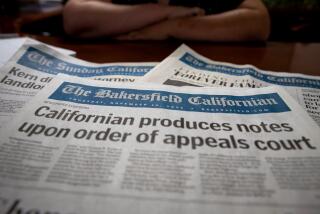Prosecutors Win Rulings in Cosby Case
Over strong defense objections, a Superior Court judge Wednesday decided to let prosecutors in the Ennis Cosby murder trial tell jurors about jailhouse letters allegedly written by the defendant about the killing.
The decision by Superior Court Judge Don Perez was one of three pieces of bad news for lawyers defending Mikail Markhasev, 18, the Ukrainian immigrant accused of killing the 27-year-old son of television star Bill Cosby.
Perez will let prosecutors tell jurors about a racial slur that they say Markhasev used shortly after Cosby’s death while telling friends that he shot an African American. Although police have said that robbery was the motive for the killing, the judge’s decision introduces a racial element to the case.
*
Prosecutors also said Wednesday that they have DNA evidence linking Markhasev to a dark knit cap that was wrapped around a .38-caliber revolver that they believe was the weapon used to kill Cosby. Deputy Dist. Atty. Anne Ingalls did not identify the evidence.
Perez made the decisions during a hearing to settle disputes over what evidence will be used in the trial. Jury selection is set to start June 16.
Cosby was shot in the head by a lone assailant during what police describe as a bungled robbery attempt Jan. 16, 1997, after he pulled off the northbound San Diego Freeway to fix a flat tire on his Mercedes-Benz. Police say Markhasev ditched the gun about five miles from the crime scene that night.
According to court papers, Michael Chang and Christopher So told Los Angeles police that Markhasev called Chang a few days after the slaying and asked for help in finding the gun he had thrown away the night of the shooting.
The three men never found the weapon. Authorities located it weeks later.
It was during the search with Chang and So that Markhasev allegedly made the racially tinged statement that was at issue Wednesday. Chang has told police that Markhasev said: “I shot the n-----.”
Alternate Deputy Public Defender Henry J. Hall said that letting the slur into evidence would be inflammatory “and there appears to be no basis for it.”
He said there has been no evidence that the killing was based on race.
Chang and So later told police about the incident and took them to the area they had searched with Markhasev. Officers found the gun in the vicinity.
Chang’s and So’s help led police to Markhasev, who was indicted March 12, 1997. He has been in jail without bond since then.
While in jail, Markhasev allegedly wrote the letters.
Some letters that have been tied to Markhasev surfaced last year in the National Enquirer. The tabloid published a story saying that Markhasev wrote three letters to another inmate in which he discussed the killing.
The paper reported that in one letter, Markhasev said: “I went to rob a [drug] connection, but I obviously found something else.”
Attorneys in the case refused to say whether those letters are among those that were discussed in court Wednesday. Ingalls and Hall said they could not comment because a gag order imposed by Perez prohibits either side from discussing evidence outside court.
*
Although contents of the letters were not revealed, Hall argued strenuously that Markhasev did not write them. He said a jailhouse informant fabricated them. The letters are merely copies, Hall said, and the informant has been unable to provide the originals.
He said the informant has a long criminal record, including forgery, and would do almost anything to earn lenient treatment on his earlier charge.
“This whole business about the letters stinks,” he said.
But the judge said he will let prosecutors show them to jurors because they have a handwriting expert who is expected to say Markhasev wrote them.
More to Read
Sign up for Essential California
The most important California stories and recommendations in your inbox every morning.
You may occasionally receive promotional content from the Los Angeles Times.










